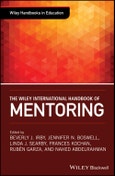The first collection in the area of mentoring that applies theory to real-world practice, research, programs, and recommendations from an international perspective
In today’s networked world society, mentoring is a crucial area for study that requires a deep international understanding for effective implementation. Despite the immense benefits of mentoring, current literature on this subject is surprisingly sparse. The Wiley International Handbook of Mentoring fills the need for a comprehensive volume of in-depth information on the different types of mentoring programs, effective mentoring practices, and emerging practical and applicable theories. Based on sound research methodologies, this unique text presents original essays by experts from over ten different countries, demonstrating the ways mentoring can make a difference in the workplace and in the classroom; these experts have an understanding of mentoring worldwide having worked in mentoring in over forty countries.
Each of the Handbook’s four sections - mentoring paradigms, practices, programs, and possibilities - include a final synthesis chapter authored by the section editors that captures the essence of the lessons learned, applies a global context, and recommends research avenues for further exploration. This innovative volume demonstrates how mentoring in any culture can help employees to complete tasks and advance in their positions, aid in socialization and assimilation in various settings, provide diverse groups access to resources and information, navigate through personalities, politics, policies, and procedures, and much more.
- Offers an inclusive, international perspective that supports moving mentoring into a discipline of its own and lays a theoretical foundation for further research
- Shows how emerging practical theories can be implemented in actual programs and various scenarios
- Examines a wide range of contemporary paradigms, practices, and programs in the field of mentoring, including a panorama of introspections on mentoring from international scholars and practitioners
- Includes historical and epistemological content, background information and definitions, and overviews of fundamental aspects of mentoring
The Wiley International Handbook of Mentoring is an essential volume for a global readership, particularly teachers of mentoring courses, trainers, and researchers and practitioners in a variety of fields such as business, education, government, politics, sciences, industry, or sports.
Table of Contents
Preface ix
Notes on Contributors xv
Section I Mentoring Paradigms
Beverly J. Irby and Rubén Garza, Section Editors
1 Defining Mentoring: An Elusive Search for Meaning and a Path for the Future
Nora Dominguez and Frances Kochan
2 Epistemological Beginnings of Mentoring
Beverly J. Irby, Nahed Abdelrahman, Rafael Lara‐Alecio, and Tammy Allen
3 Social Capital as Mentoring: A New Paradigm in Action
John M. Heffron
4 Mentoring in the Human Resource Development Context
Shinhee Jeong and Sunyoung Park
5 Constructivism and Mentoring
Arthur Shapiro
6 Mentoring as Loose Coupling: Theory in Action
Susan Brondyk
7 Relational Mentoring for Developing Novice Principals as Leaders of Learning
Sonya Hayes
8 Mentoring in a Globally Active Learning Context: Initiation, Engagement, Implementation, and Aftermath
Carol A. Mullen
9 Synthesis of Mentoring Paradigms
Rubén Garza and Beverly J. Irby
Section II Mentoring Practices
Linda J. Searby, Section Editor
10 Mentoring Within Communities of Practice
SueAnn I. Bottoms, Jerine Pegg, Anne Adams, Hilary Smith Risser, and Ke Wu
11 Mentoring Women Faculty of Color in the Academy
Brenda Lloyd‐Jones and Gaëtane Jean‐Marie
12 The Mentoring Mindset: Desired Practices of a Protege in a Mentoring Relationship
Linda J. Searby
13 Collaborative Learning and Knowledge‐Sharing: The Potential of New Administrator Networks and Mentoring Programs
Catherine M. Hands, Denise E. Armstrong, and Carol Mitchell
14 Faculty‐Inspired Strategies for Early Career Success Across Institutional Types: The Role of Mentoring
Vicki L. Baker, Leslie D. Gonzales, and Aimee LaPointe Terosky
15 Practices of Cognitive Apprenticeship and Peer Mentorship in a Cross‐Global STEM Lab
Carol A. Mullen
16 Professional Knowledge of Teaching and the Online Mentoring Program: A Case Study in the Brazilian Educational Context
Aline M. de M. R. Reali, Maria da Graca N. Mizukami, and Regina M. S. P. Tancredi
17 Synthesis of Mentoring Practices
Linda J. Searby
Section III Mentoring Programs
Jennifer N. Boswell, Section Editor
18 The College Mentoring Experience - A Hong Kong Case Study
Barley Mak
19 Who Mentors Me? A Case Study of Egyptian Undergraduate Students
Nahed Abdelrahman, Beverly J. Irby, Hamada El Farargy, Rafael Lara‐Alecio, and Fuhui Tong
20 Mentoring Faculty for Quality Enhancement in Indian Higher Education
Ankur Gupta
21 National Principal Mentor Program
Carol A. Riley
22 Educational Counselors as Leaders in Developing Personal and Communal Resilience
Heidi Flavian and Efrat Kass
23 Training Teachers in Academic Mentoring Practices: Empirical Foundations and a Case Example
Simon Larose and Stéphane Duchesne
24 Closing the Mentorship Loop
Susan Ferguson, Andrea Kent, and André Green
25 Roots to Wings-A Transformative Co‐Mentoring Program to Foster Cross‐Cultural Understanding and Pathways into the Medical Profession for Native and Mexican American Students
Mirna I. Ramos‐Diaz, Maxine Brings Him Back‐Janis (Lako Wechokun Gluha Mani Win), Henry M. Strom (Stahobi), Bernadette Howlett, Ann M. Renker, and Davis E. Washines (Yellowash)
26 Synthesis of Mentoring Programs
Jennifer N. Boswell
Section IV Mentoring Possibilities
Frances Kochan, Section Editor
27 Mentoring Policies: Possibilities, Challenges, and Future Directions
Göran Fransson
28 The Power, Politics, and Future of Mentoring
Geraldine Mooney Simmie
29 Mentoring Across Race, Gender, and Generation in Higher Education: A Cross‐Cultural Analysis
Frances Kochan and Sydney Freeman, Jr.
30 Realizing the Power of Mentoring
Jane Kirkby and Lucas Walsh
31 On the Threshold of Mentoring: Recognizing and Negotiating the Liminal Phase
David Starr‐Glass
32 ONSIDE Mentoring: A Framework for Supporting Professional Learning, Development, and Well‐Being
Andrew J. Hobson
33 Brain‐Based Mentoring to Help Develop Skilled and Diverse Communities
Ellen Weber
34 Dynamic Model of Collaborative Mentorship: Agency, Values, Engagement, Patterns, and Roles
Barbara Trube, Dianne Gut, Pam Beam, and Beth VanDerveer
35 Synthesis of Mentoring Possibilities
Frances Kochan
Index








